Browse
Education
Michigan State University and the Alliance for African Partnership Awarded $895,000 Carnegie Grant
FOR IMMEDIATE RELEASE
Michigan State University and the Alliance for African Partnership Awarded $895,000 Carnegie Grant for REIMAGINE Project Advancing Graduate Education and AI in Africa
Michigan State University (East Lansing, Michigan) has been awarded a 36-month, $895,000 grant from the Carnegie Corporation of New York under its prestigious Higher Education in Africa program. The grant will support the Alliance for African Partnership (AAP) consortium’s efforts to advance innovative graduate education ecosystems across African universities and to develop a collaborative, transdisciplinary doctoral program focused on artificial intelligence.
The AAP REIMAGINE initiative supports forward-thinking strategies that reshape higher education for the future. Through this investment, AAP—MSU’s flagship platform for equitable and sustainable collaboration with African higher education institutions—will expand its work to strengthen graduate student environments, enhance supervisory and research cultures, and foster institutional systems that enable student success on the continent.
A key component of the project is the development of multiple Artificial Intelligence Doctoral Training Programs, designed to equip a new generation of African scholars with advanced AI expertise, research skills, and leadership capacity. The initiative will leverage MSU’s long-standing partnerships with universities across Africa, ensuring African-led direction, contextual relevance, and sustainability.
“The REIMAGINE Project is fundamentally about examining how doctoral education and research ecosystems across African universities can evolve to better support transdisciplinary scholarship in artificial intelligence,” said Dr. Jose Jackson-Malete, Co-Director of the Alliance for African Partnership and Project Lead for the Carnegie-funded REIMAGINE initiative. “This work is critically needed now. Without intentional investment in doctoral training, supervision systems, and collaborative research environments, Africa risks falling behind in shaping—and benefiting from—the rapid advances in AI that are already transforming societies and economies worldwide.”
Over the next three years, the project will:
Review and strengthen policies for graduate student mentorship, supervision, and research environments across AAP member institutions.
Support institutional innovations that promote student well-being, academic success, and professional development.
Launch a continentally grounded transdisciplinary doctoral program focused on artificial intelligence, expanding access to emerging fields that drive economic and societal transformation.
Foster deeper collaboration between MSU scholars and African research teams through joint programs, co-created curricula, and capacity-building initiatives.
Since its inception in 2016, AAP has worked across the consortium and beyond to promote equitable partnerships, research excellence, and sustainable development solutions. This new investment from Carnegie marks a pivotal milestone in scaling AAP’s impact on higher education transformation.
About the Alliance for African Partnership (AAP) AAP is a consortium convened by Michigan State University to promote collaborative, transdisciplinary partnerships among 10 member African institutions, MSU, and global stakeholders. The Alliance focuses on building capacity, supporting innovation, and advancing shared research priorities that address global challenges.
About the Carnegie Corporation of New York Founded in 1911 by Andrew Carnegie, the Carnegie Corporation of New York is one of America’s oldest philanthropic foundations focused on advancing knowledge and understanding through grants in education, strengthening U.S. Democracy, international peace and security, and higher education in Africa, supporting initiatives that promote civic engagement, reduce polarization, and foster global cooperation, continuing Carnegie's legacy of social progress. The REIMAGINE program supports bold, future-focused approaches to revitalizing higher education and strengthening global knowledge systems.
By:
Baboki Gaolaolwe-Major
Thursday, Jan 22, 2026
YOUTH EMPOWERMENT
+2
No Preview Available
Leave a comment
AAP Global Engagement Fund Support Arts-Based Youth Research and Engagement
When photographer and educator Prof. Peter Glendinning of Michigan State University returned to South Africa this September, his goal went far beyond presenting artwork. Supported by the Alliance for African Partnership (AAP) Global Engagement Fund (GEF), Glendinning traveled to Johannesburg and Cape Town to advance a collaborative, arts-driven research initiative that is reshaping how youth experiences are documented and understood across Africa. For years, Glendinning has been developing Attached to the Soil, a project that pairs portrait photography with metaphor and narrative to explore young people’s aspirations, challenges, and identities. What began as a 2019 Fulbright project in South Africa has evolved—through sustained partnership—into a model for how the arts can generate meaningful social insight. This work aligns directly with AAP’s culture & society priority area, which supports projects that use cultural expression to address complex societal issues.
Strengthening a Continental Research Partnership
During his visit, Glendinning met with partners at University of Pretoria, one of AAP’s 12 member institutions, including Prof. Zitha Mokomane, a professor in the Department of Sociology and Deputy Dean for Teaching and Learning in the Faculty of Humanities, who has been conducting sociological analysis of the project’s original youth-created images and stories. The findings point to recurring themes: belonging, hope, fear, opportunity, and the persistence of socio-economic barriers.
With support from the Global Engagement Fund, the partners spent their time together outlining the next phase of the work—a potential 2027 pan-African expansion that could engage youth from multiple institutions and countries. The goal is to create one of the most comprehensive collections of narrative and visual data on African youth aspirations to date.
“The dataset we envision would allow us to compare experiences across countries, contexts, and cultures, using the arts as a bridge,” Glendinning explained. The in-person meetings made possible by the GEF award were essential for refining the research design, establishing a shared methodological framework, and preparing for future proposal development.
Cultural Institutions as Crucial Partners
Glendinning’s work emphasizes not only the creation of new cultural materials but also the preservation of Africa’s photographic heritage. While in Johannesburg, he met with leaders at the Bensusan Museum of Photography to advance efforts to secure funding for preserving its internationally significant collection of historic photographic equipment and images. He also held discussions at the Nelson Mandela Foundation, which held an 8-month exhibit of the project in 2023, exploring how youth-generated narratives from Attached to the Soil could contribute to public memory and civic learning through the foundation’s ongoing partnership. These engagements expand the project’s reach beyond academia and into community and heritage spaces—an approach deeply aligned with AAP’s focus on research for broader impact.
Festival Participation Amplifies Youth Perspectives
Glendinning’s work also reached public audiences during the inaugural Cape Town Photography Festival, where Attached to the Soil opened as an exhibition at the Simon’s Town Museum. The festival setting provided a platform for deeper conversation around the project’s themes. During a public dialogue, Glendinning and Malissa Louw, one of the original participants, spoke about the creative process and the realities behind the images—drawing attention to the power of youth storytelling as a form of social documentation.
He also led two workshops: a digital photography master-class for community members and a session for 40 students at the Cape Peninsula University of Technology. Both emphasized photography as a tool for reflection, empowerment, and evidence-gathering—illustrating how artistic training can support community insight and youth leadership.
A Model for Arts-Driven, Partnership-Based Research
Following the festival, Glendinning continued planning with Prof. Mokomane during her September visit to Michigan State University, which was also supported by the GEF. Together, they are refining the concept for the multi-country expansion and identifying ways for AAP partners to contribute to the next phase.
For AAP, Glendinning’s and project and his partnership with Mokomane exemplify the role arts and culture can play in addressing societal challenges: by elevating local narratives, strengthening community connections, and deepening understanding across diverse contexts. The Global Engagement Fund is central to this impact—making it possible for faculty like Glendinning to build the relationships and shared vision that long-term, equitable partnerships require.
As plans move forward, Attached to the Soil will offer youth across the continent the chance to tell their stories—and help researchers, educators, and communities better understand the world through their eyes.
By:
Baboki Gaolaolwe-Major
Monday, Dec 15, 2025
CULTURE AND SOCIETY
+2
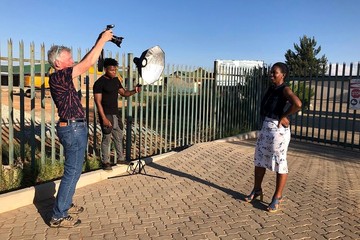
Leave a comment
AAP Steps Up Its Global Footprint at Falling Walls 2025
The Alliance for African Partnership (AAP) strengthened its global visibility this year with a significantly expanded presence at the Falling Walls Summit in Berlin, signaling a new phase in Africa’s engagement with one of the world’s leading platforms for science, innovation, and societal impact.
The momentum follows a fast-growing collaboration between AAP and the Falling Walls Foundation, an alliance that has already produced tangible results. LUANAR in Malawi became the first institution in the consortium to launch a combined Falling Walls Engage and Lab, followed by the University of Botswana, which introduced the Gaborone Lab in 2025 and is preparing to roll out the Engage program in 2026. For AAP, these developments are more than individual wins: they mark the beginning of a wider rollout across the consortium, designed to strengthen research communication and create a more connected science engagement ecosystem across Africa.
At this year’s Summit, AAP member universities made their strongest showing yet. Lab winners from LUANAR and the University of Botswana took the stage in Berlin, showcasing African innovation to an international audience of scientists, investors, policymakers, and global media. Senior leaders from across the consortium also attended, led by Michigan State University’s Vice-Provost for International Studies and Programs, Professor Titus Awokuse.
During the delegation meeting with Falling Walls’ Executive Director, Andreas Kosmider, there was clear enthusiasm about the trajectory of the partnership. Discussions focused on deepening African participation in next year’s Summit and widening the circle of collaborators to include government ministries, policymakers, and funding agencies, an effort aimed at opening new channels for African–German cooperation.
For AAP, the stakes are high. Strengthening research communication equips young African scientists to tell their stories compellingly, improving public understanding and increasing the influence of research on policy. The Labs, meanwhile, function as early-stage innovation pipelines, giving African entrepreneurs exposure, mentorship, and a global platform for emerging ideas. The partnership also enhances institutional visibility, positioning African universities as active players in global science diplomacy.
Planning has already begun for next year’s Summit, with AAP leaders working on a coordinated roadmap to ensure a more visible and more diverse African presence in 2026. The goal is not simply to attend, but to shape the agenda by bringing African voices, research, and innovation to the centre of the global conversation.
As AAP expands its Falling Walls footprint, the partnership is beginning to look less like a program and more like an ecosystem-building catalyst. It is strengthening the consortium internally, opening new possibilities externally, and giving African researchers and innovators a much-needed global stage. And if the early signs are anything to go by, the walls separating African science from global visibility are starting to crack, making space for a new era of collaboration and opportunity.
By:
Baboki Gaolaolwe-Major
Thursday, Dec 11, 2025
CULTURE AND SOCIETY
+3

Leave a comment
Shaping Global Partnerships Through Science, Technology, and Education
A Profile of Nizar Lajnef, MSU’s New Associate Dean for Research and International Partnerships.
On August 16, Michigan State University (MSU) appointed Nizar Lajnef as the new Associate Dean for Research and International Partnerships of MSU’s International Studies and Programs (ISP). For Lajnef, the role represents both a return to his roots and an opportunity to shape MSU’s global engagement at a critical time.
Originally from Tunisia, Lajnef first came to MSU as an international student. Having completed a USAID-funded master’s program in Tunisia in collaboration with Virginia Tech, he went on to pursue both his Master’s and PhD at Michigan State. That experience gave him a firsthand appreciation for the transformative power of international education—not only for students, but also for the global image of academia and the “soft impact” that collaboration brings to communities and societies. “Education,” he reflects, “is the first thing that should be an objective when you reach out and collaborate with people. It’s something very close to my heart.”
Throughout his career, Lajnef has remained deeply connected to Africa. His research and professional engagements have taken him across the continent and beyond, with work spanning more than 20 countries in Europe, Asia, and Africa. He sees this new role as a way to give back and to step up during what he calls “a very difficult time for international studies.” Rather than shy away, he views this moment as an opportunity to strengthen MSU’s global ties and make them more resilient.
Lajnef brings with him extensive research experience and a record of success in securing external funding—close to $28 million over the course of his career. His expertise lies in areas at the forefront of global transformation, particularly the digital economy and the impact of artificial intelligence (AI) on developing countries. He believes these fields will shape the future of education, employment, and entrepreneurship, and sees enormous potential for Africa. “If I look at the number of startups in AI around the world,” he notes, “the U.S. and China dominate. In Africa, across more than 50 countries, there have been barely a dozen in the past five years. There’s a tremendous opportunity there, and it’s one of the strengths I want to bring to MSU’s global agenda.”
At the heart of his vision is the commitment to equitable partnerships. MSU, he emphasizes, has a long history of meaningful collaborations with African institutions—relationships built not on one-sided aid or extractive research, but on mutual benefit, capacity building, and shared impact. He argues that the future of MSU-Africa collaborations lies in deepening these ties, ensuring that investments in research, infrastructure, and digital transformation deliver value both to African universities and communities as well as to MSU. Key areas of opportunity, he suggests, will include infrastructure development—such as telecommunications, transportation, and health systems—alongside the rapid digital transformation reshaping economies worldwide.
Despite challenges in the political and funding environment, Lajnef remains confident about MSU’s path forward. He points to the university’s 65-year history of engagement with Africa as proof of its staying power. Funding models may evolve, but the mission endures. Private donors and foundations, he notes, remain committed to supporting MSU’s work on the continent. And just as importantly, the lessons learned abroad have direct applications at home in Michigan, where communities face many of the same challenges.
For Lajnef, the way forward is clear: MSU must hold fast to its values, adapt as needed, and continue advancing its mission of global engagement. “We’re going to stick to our values,” he says firmly. “We have a strong history, we know what we are doing, and we’re going to keep doing it. Even if resources are limited or circumstances change, the good work that MSU has been doing for 65 years will continue.”
By:
Baboki Gaolaolwe-Major
Wednesday, Sep 17, 2025
EDUCATION
Leave a comment
UB–MSU Partnership Builds Bridges Between Science and Society
The University of Botswana (UB) and Michigan State University (MSU) are working together to strengthen the role of science, technology, and innovation (STI) in solving pressing global challenges through their joint project, Promoting Science Communication and Engagement through Training and Digital Media Platforms. Supported by the Alliance for African Partnership’s (AAP) Partnership for Innovative Research in Africa (PIRA) seed funding program, the initiative seeks to bridge the gap between science and society by equipping young scholars and early-career researchers with essential science communication skills.
The award-winning project focuses on improving scientists' ability to engage diverse audiences, including policymakers, funders, and the wider public. Its goal is to foster scientific literacy, build public trust in research, and ensure that scientific knowledge directly contributes to solving pressing societal challenges. Key activities include science communication training workshops for postgraduate students and early-career researchers; mentorship programs pairing young scientists with experienced communicators; a 3-Minute Thesis (3MT) competition, which provides a platform for students to showcase their research in clear and engaging ways; and digital media platforms designed to create interactive spaces between scientists and the public.
Dr. Mogopodi (University of Botswana) emphasized that “science communication is not just about simplifying research, but about creating meaningful dialogue between scientists and communities.” Dr. McFarlane-Alvarez (Michigan State University) highlighted the importance of international collaboration, noting that the partnership between UB and MSU “brings together diverse perspectives from the global North and South, creating models of training and engagement that can be replicated across Africa.”
The project also aligns with the Alliance for African Partnership (AAP) imperatives, with a strong focus on education, youth empowerment, and gender equality, ensuring that underrepresented groups, particularly women in STEM, are included in science communication initiatives. With this award, the team plans to expand its activities, improve its digital platforms, and extend outreach to broader audiences. The recognition underscores the vital role of science communication in advancing research impact, attracting funding, and shaping evidence-based policies. This achievement marks a milestone in the growing movement to make science more accessible, inclusive, and impactful across Africa and beyond.
By:
Baboki Gaolaolwe-Major
Wednesday, Sep 17, 2025
EDUCATION
+1
Leave a comment
African Futures Cohort 5 Arrives On Campus
Alliance for African Partnership (AAP), a consortium of ten leading African universities, Michigan State University (MSU), and a network of African research institutes, is excited to welcome the fifth cohort of the African Futures Research Leadership Program to MSU for the in-person portion of the program. Each early career scholar is paired with a faculty mentor from MSU and their home institution for one year of virtual and in-person collaboration to strengthen research skills, innovations in teaching, writing of scholarly and/or policy publications, dissemination of research results and grant proposals.
A consortium-wide initiative, the African Futures program is designed to strengthen the capacity of a cadre of African researchers to return to their home institutions and become scientific leaders in their community, establish long-term partnerships with MSU faculty, co-create innovative solutions to Africa’s challenges, and in turn become trainers of the next generation of researchers.
African Futures Cohort 5: Alfdaniels Mabingo Performing Arts and Film Makerere University Home Mentor - Sylvia Antonia Nakimera Nannyonga-Tamusuza, Dept of Performing Arts and FilmMSU Mentor – Philip Effiong, Dept of English, Theater Studies & Humanities & Gianina Strother, Dept of African American and African Studies Gladys Gakenia Njoroge Pharmacy Practice and Public Health United States International University – Africa Home Mentor - Calvin A. Omolo, Dept of Pharmacy Practice and Public HealthMSU Mentor - Yuehua Cui, Dept of Statistics and Probability Seynabou Sene Plant Biology University Cheikh Anna Diop Home Mentor - Abdala Gamby Diedhiou, Dept of Plan BiologyMSU Mentor - Lisa Tiemann, Dept of Plant, Soil, and Microbial Sciences Portia T. Loeto Educational Foundations (Gender Studies Section) University of Botswana Home Mentor - Godi Mookode, Dept of SociologyMSU Mentor - Soma Chauduri, Dept of Sociology Betina Lukwambe Aquaculture Technology University of Dar es Salaam Home Mentor – Samwel Mchele Limbu, Dept of AquacultureMSU Mentor - Abigail Bennett, Dept of Fisheries and Wildlife & Maria Claudia Lopez, Dept of Community Sustainability Assilah Agigi Business Management University of PretoriaHome Mentor - Alex Antonites, Dept of Business Management MSU Mentor - Sriram Narayanan, Dept of Supply Chain Management Miriam Nthenya Kyule Agricultural Education and Extension Egerton University Home Mentor - Miriam Karwitha Charimbu, Dept of Crops, Horticulture and Soils MSU Mentor - Susan Wyche, Dept of Media and Information Studies Asha Nalunga Agribusiness and Natural Resource Economics Makerere University Home Mentor - Bernard Bashaasha, Dept of Agribusiness and Natural Resource Economics MSU Mentor - Saweda Liverpool-Tasie, Dept of Agricultural, Food, and Resource Economics
Ezinne Ezepue (participating virtually)Theatre & Film Studies University of Nigeria, Nsukka Home Mentor - Chinenye Amonyeze, Dept of Theatre & Film StudiesMSU Mentor - Jeff Wray, Dept of English
“We were extremely impressed with the quality and diversity of applications we received for this cohort of the African Futures program. We are excited to build on the successes of past cohorts and continue to evolve this program as we support the next generation of African research leaders,” said Jose Jackson-Malete, co-director of the Alliance for African Partnership.
Differing from previous cohorts, Cohort 5 is piloting a hybrid model of the African Futures program. The scholars began their work in February 2025 virtually, then will spend the fall semester at Michigan State University working closely with their MSU mentor. They will then complete the rest of their year back at their home institution, culminating in a research showcase in February 2026 to share the research they’ve done. Partnerships between mentors and mentees are expected to continue beyond the end of the program and lead to sustainable collaboration and future funding opportunities.
By:
Baboki Gaolaolwe-Major
Wednesday, Sep 17, 2025
EDUCATION
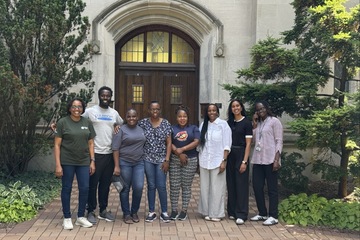
Leave a comment
Engineering a Sustainable Future Through Climate-Smart Agriculture
A profile of MSU Assistant Professor and AAP GEF Awardee, Dr. Daniel Uyeh
Science and technology are central to tackling global challenges like climate change and food insecurity. In June 2025, the Alliance for African Partnership (AAP) launched the Faculty Global Engagement Fund (GEF) to help faculty maintain momentum in their research endeavors and international collaborations by providing travel support to engage with African partner institutions and/or to present their research at conferences or other public forums. Among the inaugural GEF cohort is MSU faculty member Dr. Daniel Uyeh, a Nigerian scientist and engineer whose work integrates advanced sensors, automated weather stations, and AI-enabled decision-support systems to turn real-time climate data into actionable guidance for farmers and policymakers—strengthening food security and resilience across the continent.
Born and raised in Nigeria, Dr. Uyeh spent most of his childhood in rural neighborhoods. There he witnessed firsthand how the practice of farming and knowledge of agriculture shaped community livelihoods. He also witnessed the work of his father, a vocational teacher who taught agriculture to the community to better improve their farming capabilities. Inspired by his father’s role as a teacher and his experience in farming communities, Uyeh focused his academic career on agriculture. From his internships in biotechnology and pharmaceuticals to his Bachelors, Masters, and PhD degrees, he has been studying the field of agriculture for over a decade. Currently, he is working as both assistant professor in the Department of Biosystems and Agricultural Engineering as well as a principal investigator in the Climate-Smart Decision Support Systems Group of MSU. He is a Nigerian scientist and engineer who, in his own words works on “multidisciplinary research projects towards improving efficiency and minimizing production costs, thus ensuring resilient and sustainable agriculture”.
His resume is impressively extensive and his most recent project, which he highlighted during the application for GEF support, continues to show his dedication and experience in the field of agricultural research.
This project focuses on the development and deployment of automated weather stations and other advanced sensory technologies, calibrated to an integrated decision support system (DSS). The DSS will translate real time climate data into actional insights for farmers and policy makers, allowing timely informed decisions on critical aspects of farming and agriculture. By stabilizing food supplies in the face of erratic weather, this work has the potential to deliver immediate, measurable impact for communities across Sub-Saharan Africa.
Uyeh and his team have already developed and piloted an integrated platform that provides real-time, weather and advisory services for farmers, allowing them to better prepare for the challenges facing their farms and livestock. In the future he intends to expand the deployment of automated weather sensory technology as well as the DSS system across the entirety of Africa, doing so through further partnerships with African government agencies, many of whom are already investing in adaptation and agricultural digitization. In Uyeh’s words: “The end goal of my research is to create AI-enabled, climate-smart tools that make agriculture more resilient, sustainable, and profitable. My work aims to provide farmers, especially smallholders, women, and youth, with reliable, hyperlocal decision-support systems that help them adapt to climate change, reduce input costs, and improve yields. At the same time, I aim to support breeders and policymakers with enhanced data to inform varietal development, resource utilization, and climate adaptation strategies. Ultimately, my vision is to contribute to transforming agriculture from a system vulnerable to erratic weather and labor shortages into one that is data-driven, low-emission, and sustainable, securing food systems and livelihoods for millions worldwide.”
In our interview for this article, Uyeh was asked what he would say to future researchers inspired by his example—just as he was by his father. His advice: “Research is about exploring the unknown, asking questions others may overlook, and learning from every setback. Stay curious, stay resilient, and view failures not as dead ends but as stepping stones toward discovery and impact.”
By:
Baboki Gaolaolwe-Major
Wednesday, Sep 17, 2025
EDUCATION
+1
Leave a comment
African Futures Cohort 5 Arrives at MSU
Alliance for African Partnership (AAP), a consortium of ten leading African universities, Michigan State University (MSU), and a network of African research institutes, is excited to welcome the fifth cohort of the African Futures Research Leadership Program to MSU for the in-person portion of the program. Each early career scholar is paired with a faculty mentor from MSU and their home institution for one year of virtual and in-person collaboration to strengthen research skills, innovations in teaching, writing of scholarly and/or policy publications, dissemination of research results and grant proposals.
A consortium-wide initiative, the African Futures program is designed to strengthen the capacity of a cadre of African researchers to return to their home institutions and become scientific leaders in their community, establish long-term partnerships with MSU faculty, co-create innovative solutions to Africa’s challenges, and in turn become trainers of the next generation of researchers.
African Futures Cohort 5: Alfdaniels Mabingo Performing Arts and Film Makerere University Home Mentor - Sylvia Antonia Nakimera Nannyonga-Tamusuza, Dept of Performing Arts and FilmMSU Mentor – Philip Effiong, Dept of English, Theater Studies & Humanities & Gianina Strother, Dept of African American and African Studies Gladys Gakenia Njoroge Pharmacy Practice and Public Health United States International University – Africa Home Mentor - Calvin A. Omolo, Dept of Pharmacy Practice and Public HealthMSU Mentor - Yuehua Cui, Dept of Statistics and Probability Seynabou Sene Plant Biology University Cheikh Anna Diop Home Mentor - Abdala Gamby Diedhiou, Dept of Plan BiologyMSU Mentor - Lisa Tiemann, Dept of Plant, Soil, and Microbial Sciences Portia T. Loeto Educational Foundations (Gender Studies Section) University of Botswana Home Mentor - Godi Mookode, Dept of SociologyMSU Mentor - Soma Chauduri, Dept of Sociology Betina Lukwambe Aquaculture Technology University of Dar es Salaam Home Mentor – Samwel Mchele Limbu, Dept of AquacultureMSU Mentor - Abigail Bennett, Dept of Fisheries and Wildlife & Maria Claudia Lopez, Dept of Community Sustainability Assilah Agigi Business Management University of PretoriaHome Mentor - Alex Antonites, Dept of Business Management MSU Mentor - Sriram Narayanan, Dept of Supply Chain Management Miriam Nthenya Kyule Agricultural Education and Extension Egerton University Home Mentor - Miriam Karwitha Charimbu, Dept of Crops, Horticulture and Soils MSU Mentor - Susan Wyche, Dept of Media and Information Studies Asha Nalunga Agribusiness and Natural Resource Economics Makerere University Home Mentor - Bernard Bashaasha, Dept of Agribusiness and Natural Resource Economics MSU Mentor - Saweda Liverpool-Tasie, Dept of Agricultural, Food, and Resource Economics
Ezinne Ezepue (participating virtually)Theatre & Film Studies University of Nigeria, Nsukka Home Mentor - Chinenye Amonyeze, Dept of Theatre & Film StudiesMSU Mentor - Jeff Wray, Dept of English
“We were extremely impressed with the quality and diversity of applications we received for this cohort of the African Futures program. We are excited to build on the successes of past cohorts and continue to evolve this program as we support the next generation of African research leaders,” said Jose Jackson-Malete, co-director of the Alliance for African Partnership.
Differing from previous cohorts, Cohort 5 is piloting a hybrid model of the African Futures program. The scholars began their work in February 2025 virtually, then will spend the fall semester at Michigan State University working closely with their MSU mentor. They will then complete the rest of their year back at their home institution, culminating in a research showcase in February 2026 to share the research they’ve done. Partnerships between mentors and mentees are expected to continue beyond the end of the program and lead to sustainable collaboration and future funding opportunities.
For more information, visit the Alliance for African Partnership website
By:
Justin Rabineau
Thursday, Sep 4, 2025
AGRI-FOOD SYSTEMS
+6
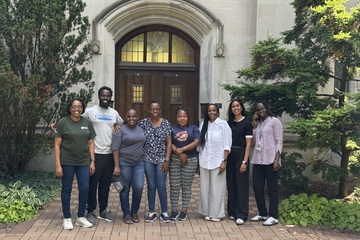
Leave a comment
100,000 PhDs in 10 Years? Africa Needs More Than Numbers—We Need a Doctoral Revolution
Across Africa, the demand for knowledge has never been greater. From climate change to health systems, digital transformation to food security, the continent faces a web of complex, intersecting challenges. Yet paradoxically, while the urgency for African-led solutions intensifies, our universities struggle to produce the kind of advanced, homegrown expertise needed to drive sustainable development.
At the core of this dilemma is a systemic underproduction and underutilization of PhDs.
Africa contributes less than 2% of global research output, and many of its universities remain under-resourced, underfunded, and overly dependent on external collaborators. Doctoral education, supposed to be an engine of innovation, leadership, and knowledge production, suffers from fragile infrastructure, limited mentorship capacity, brain drain, and misaligned curricula.
It’s within this context that the Alliance for African Partnership (AAP) convened a number of timely and ambitious discussions over the past six months including a panel at the Paul Zeleza Conference at Howard University in May and a workshop during AAP’s annual consortium meeting held recently in Lilongwe, Malawi. The focus? A bold target set by the African Union: 100,000 PhDs in 10 years. This would require training scholars already in the system to PhD level and attracting new students into the system. But these conversations went far beyond the numbers, they were about the transformation of Africa’s doctoral education systems needed to achieve this goal.
Beyond Numbers: Rebuilding the Ecosystem
Speaking on a panel at a Howard University conference celebrating the 70th birthday of Prof. Paul Tiayambe Zeleza, Prof. Tawana Kupe called for wholesale systemic change in African graduate education, from application to graduation. Prof. Kupe is currently a higher education strategy advisor and former vice chancellor of the University of Pretoria. He emphasized the need to institute accountability mechanisms at every stage, to increase supervision capacity by having more PhD holders in universities’ faculty, to invest in infrastructure and space, and to changing from research only to coursework and sandwich doctorate structures.
At the AAP meeting in Lilongwe, Prof. Alex Kahi, AAP focal point at Egerton University, said, “To achieve this, we need a multifaceted approach. It’s not just about enrolling more students. We must reimagine the entire doctoral ecosystem, invest in funding, strengthen institutional capacity, reform curricula to solve real-world problems, and build administrative systems that support scholars from entry to postdoc.”
The discussion acknowledged that training a PhD is costly, averaging about $70,000 per year, or $350,000 across a five-year period. But more than just cost, it is also about value: What kind of researcher are we producing? Are they equipped to thrive in the job market, drive policy change, lead enterprises, or create new industries in Africa’s context?
“We need both quality and quantity,” emphasized Prof. Titus Awokuse. “But we also need relevance. At the moment, we’re not preparing enough PhDs to meet the needs of African societies and economies.”
Challenging the System: Gatekeepers, Mentors, and the Missing Middle
These discussions also shone a light on an uncomfortable but necessary issue: gatekeeping in academia. Many doctoral systems are dominated by senior academics or institutional norms that resist change, clinging to outdated methodologies, top-down supervision models, and narrow definitions of scholarly success.
At the Lilongwe meeting, Awokuse raised a crucial question: “How do we engage the gatekeepers who control access to doctoral spaces, resources, and networks?” Without disrupting this status quo, true reform may remain out of reach. For Dr. Linley Chiwona-Karltun, the solution lies partly in designing doctoral experiences around real-world relevance and global-local balance. “We need PhDs who have seen both worlds, those who spend time in the Global North and in Africa, gaining skills and perspectives that make their research meaningful on both fronts. To achieve that, we need meaningful and well-designed partnerships that will enable relevant mentorship and sharing of resources”
At the Zeleza conference panel, Prof. Kupe highlighted the crisis around PhD supervision. “Why do we recruit students even where we do not have the capacity to train or supervise, then make the students wander around looking for a supervisor?” He went on to contend that, “the one-supervisor model is terrible, especially when the supervisor is part of the majority sea of mediocrity that is so common in our public life, but can be good when the person is part of the minority oasis of hope, which is not very common.”
Decolonizing the PhD: Shifting Power, Reclaiming Voice
Several of the speakers at both events raised the need for collaboration among institutions and across global regions. At the Zeleza conference, AAP Makerere focal point Robert Wamala argued that, “universities could overcome some of their problems by investing in things like virtual laboratories, virtual research platforms and joint degree programmes.” AAP Co-Director, Amy Jamison suggested that joint supervision models involving north-south partnerships could alleviate the supervisor shortage crisis.
But it’s not just about collaboration, it’s also about reclaiming autonomy. “We need a paradigm shift,” said Dr. Dorothy Ngila, Deputy Chair of the AAP advisory board, at the Lilongwe meeting. “A shift that recognizes that African PhDs cannot simply replicate Euro-American models of knowledge. They must reflect African priorities, indigenous knowledges, and local contexts.” In this sense, decolonizing doctoral education is not just an ideological demand, it is a strategic necessity. It calls for a redesign of curricula, methodologies, and evaluation systems to empower scholars to ask the right questions and produce research that is impactful, contextually relevant, and globally respected.
At the Zeleza conference, Howard University’s Provost Prof. Anthony Wutoh applied this idea to AI as an emerging technology impacting graduate education globally. “Universities need to make use of artificial intelligence [AI] as a tool for supporting PhD training. Generative AI provides us with opportunities to rearrange the way we train doctorates, and we should leverage this.” He argued that since 90% of AI content is Eurocentric, Africans need to develop algorithms and content relevant to the African continent.
A Future of Questions, And Opportunity
Both events closed with a powerful sense of urgency, but also of possibility. And while consensus formed around several ideas, it was the questions that lingered most powerfully:
How do we retain African PhDs after we train them? Too many are lost to the Global North due to limited research funding, institutional instability, or lack of career opportunities. Can we create incentives, financial, academic, and emotional, that make African universities vibrant homes for doctoral talent and ecosystems that will enable them to thrive?
How do we embed curiosity, entrepreneurship, and leadership into doctoral pathways? PhDs should not just be technical experts, they must be problem-solvers, innovators, and systems thinkers. How do we build doctoral programmes that nurture imagination, risk-taking, and real-world impact?
How can small grants and local funding models empower the next generation of scholars? Large international funders often dominate the research agenda. Can we develop agile, African-led microgrant schemes to support emerging researchers with bold ideas and community-grounded questions?
What does it really mean to decolonize the PhD? Beyond slogans, what does it look like to change the very DNA of Africa’s doctoral systems, in who teaches, what is taught, how research is validated, and whose voices are centered?
Final Thoughts: The Doctoral Dream Must Be a Collective One
The vision of producing 100,000 PhDs in 10 years is not out of reach. But it will not happen by scaling up what already exists. It will require a deep and honest reckoning with the structures, cultures, and ideologies that shape how we train scholars in Africa. If anything, the workshop in Lilongwe was a clarion call, not just to increase PhD numbers, but to transform what a PhD means for Africa’s future.
The path ahead demands courage, collaboration, and creativity. But most of all, it demands that we ask, and keep asking, the right questions.
By:
Baboki Gaolaolwe-Major
Tuesday, Jul 15, 2025
EDUCATION
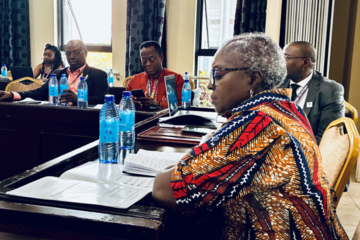
Leave a comment
Co-Creating Feasible and Sustainable Play-based Learning: A 2024 PIRA Award Winning Initiative
Every year, the Alliance for African Partnership (AAP) runs an initiative known as the Partnerships for Innovative Research in Africa (PIRA). It is an opportunity for researchers to earn the funding needed to carry out collaborative, supportive and multidirectional projects which are aimed towards improving Africa. The research ideas put forward by each PIRA awardee have shown the potential to change the future of Africa for the better.
The project created by Dr. Bethany Wilinski of Michigan State University (MSU) and Dr. Subilaga M Kejo of the University of Dar es Salaam (UDSM) is no exception. Collaborating, they are researching “Co-Creating Feasible and Sustainable Play-based Learning Approaches in Tanzania”. Based on a decade of collaboration in research into teaching in Tanzania, they have understood that play based teaching is essential for development of the global youth. It allows children to exercise skills across all academic areas, while developing them within authentic contexts, which in turn develops an enthusiasm for young students to continue learning more advanced subjects.
Play based learning has been acknowledged on a global scale, especially so once the United Nations Convention on the Rights of the Child recognized that this approach to learning will support countries’ progress toward achieving Sustainable Development Goal (SDG) 4: quality education for all. Be that as it may, while on paper it has proven to be the superior teaching model, some countries have been unable to put this into practice, such as Tanzania. Cultural differences, time and staff restraints, and even ignorance to it’s benefits, have stopped this learning style from being used in Tanzanian classrooms.
That is why the aim of Dr. Bethany Wisinki and Dr. Subilaga M Kejo’s project is to “transform pre-primary teaching and learning in Tanzania by supporting teachers’ ability to use play-based approaches effectively.” Their project consists of a three-phase plan:
1: Building a community of practice (CoP) using pre-primary teachers of UDSM’s demonstration schools, university faculty, teacher development experts and more to create a shared understanding of play based learning.
2: Together they will experiment, test and develop a professional development (PD) program about play-based for Tanzanian pre-primary teachers.
3: Pilot the PD with pre-primary teachers in Dar es Salaam and Musoma
As of this article, the team have made promising headway into phase one of their project. 7 modules have been developed, and the teachers of the CoP have already completed 6. The feedback has been positive, with the teachers stating that “they find the training to be beneficial especially because of the modality where they have opportunity to read, practice, reflect and discuss about their experiences which has enhanced their understanding…Generally, the teachers see the benefits of play and seem more motivated and confident to use play-based learning approach.”
There are already plans in place to move phase two of the project on schedule, and both Dr. Bethany Wisinki and Dr. Subilaga M Kejo feels that their work will leave a positive impact on Tanzania’s teaching methods and youth moving forward.
Upon the project’s completion, they plan to use their findings “to inform the development of a research-practice partnership with the Tanzania Institute of Education focused on improving the quality of preservice preparation for pre-primary teachers.”
By:
Baboki Gaolaolwe-Major
Tuesday, Jul 15, 2025
YOUTH EMPOWERMENT
+1
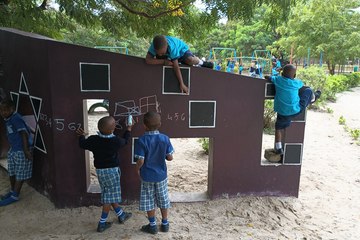
Leave a comment
The Business of Water: A COIL Project By AAP
Collaborative Online International Learning (COIL) is a method of education which fosters intercultural learning and development through shared values, presented perspectives, and mutual understanding despite geographical and cultural barriers. It connects students and professors in different countries for collaborative projects and discussions carried out virtually as part of their coursework. As an educational innovation, it reflects the values and goals of the Alliance for African Partnership (AAP) to foster mutually beneficial programs which catalyze lasting partnerships among our consortium members, which is why AAP launched the COIL Faculty Fellows Program-Africa in 2023. Since 2023, AAP along with Michigan State University’s (MSU) Global Youth Advancement Network have supported 14 teams of faculty to design and implement COIL projects.
The highly successful“The Business of Water” COIL project implemented by faculty from MSU and the University of Nigeria Nsukka is a great example of the type of impact COIL can have on both faculty members and students The project comprised 30 students from UNN and MSU, and led by Antoinette Tessmer OF THE Broad College of Business (Finance Dept.), Michigan State University and Nkadi Onyegegbu, Faculty of Education (Science Education Dept.), University of Nigeria Nsukka (Nigeria). It’s aim was to teach students the factors and events that control “The Business of Water” both in their universities and in their communities. UNN and MSU students communicated through online methods such as Zoom or WhatsApp, and they collected data through site visits and interviews among other methods.
Over the course of six weeks, the students learned the intricacies of specific water-based businesses, such as the drinking water industry and the water recycling industry, using the Environmental Social Governance (ESD) framework to structure their research and to later propose a call to action based upon their findings.
By the end of the COIL project, the students and facilitators had engaged and collaborated to such a degree that contacts, bonds and partnerships were formed, breaking through the cultural and international barriers. When giving their experiences on the project, some students wrote the following:
“At the end of the day, we pushed others in new ways of understanding and collaboration that will impact us after we graduate”
“This was my first experience collaborating with international students overseas and I can gladly say that COIL was the online tool that made it possible”
“This experience has highlighted mutual respect and honesty, allowing us to work together on relevant and environmentally sustainable solutions...I feel more equipped to contribute to global discussions”
“These problems also taught me how to communicate with people from different cultures and helped grow my interpersonal skills”
By the metric of engaging students in the “Business of Water” as well as forming intercultural bonds, the AAP has deemed this COIL project another success, among many, and is excited to champion more COIL projects to come.
By:
Baboki Gaolaolwe-Major
Wednesday, Jul 23, 2025
YOUTH EMPOWERMENT
+1
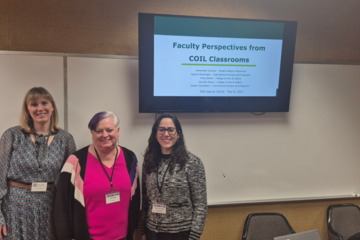
Leave a comment
Celebrating a Legacy of Vision, Dedication, and Continental Impact
We take this opportunity to honour one of our most visionary leaders, Professor Richard Mkandawire, who retires after years of exceptional service as the Director of the AAP Africa Office, as the Alliance for African Partnership (AAP) continues to grow in strength and purpose. The experience Professor Mkandawire has had with AAP has been nothing short of revolutionary. Richard was a well-known development expert and supporter of soil health who approached his work with insight, moral character, and endless enthusiasm. AAP has become a reliable forum for cooperative research, policy engagement, and capacity building as a result of his dedication to cultivating partnerships throughout Africa. He oversaw the expansion of the AAP throughout African institutions, fostering connections between policy, academia, and the public. From empowering young researchers to advocating for agricultural reform and ensuring soil health remained a top priority for food security on the continent, Richard's enthusiasm for Africa's prosperity was evident in every project he supported. Partners, mentees, and colleagues from around the world gathered at his farewell dinner, held on the last night of the AAP Consortium Meeting 2025 in Lilongwe, Malawi, to honor a man whose work has left a legacy. He was described as a leader, a mentor, and most importantly, a true servant of Africa, in the flood of tributes that poured in. Richard Mkandawire, AAP honors you. Your legacy will continue to inspire, your vision will keep guiding us, and your influence on the lives you have impacted and the organizations you have influenced will only grow. Richard, thank you. We wish you a peaceful, happy, and well-earned retirement.
By:
Baboki Gaolaolwe-Major
Thursday, Jul 10, 2025
AGRI-FOOD SYSTEMS
+2
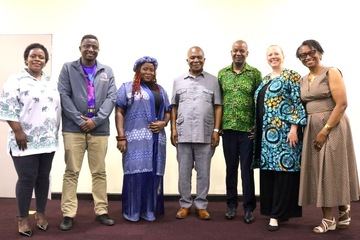


Leave a comment